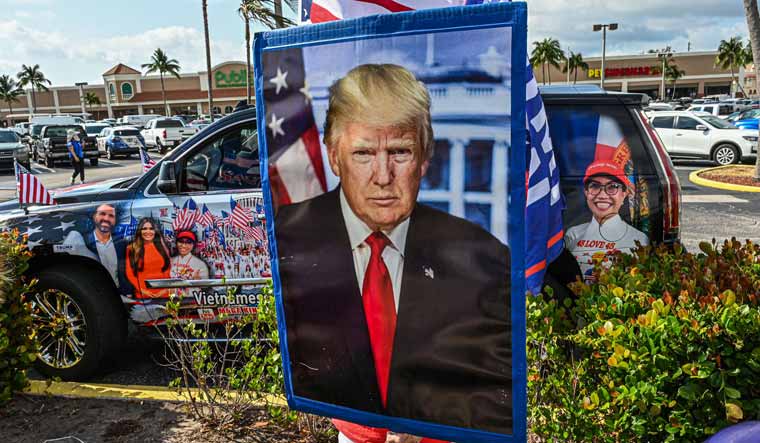The bombastic and combative politician, unapologetic and unyielding, likes to double down on his statements even in the face of fierce criticism and opposition. His populist appeal and ability connects with working-class voters and he plays on the fears and frustrations of voters.
He is an authoritarian who demands loyalty and is known to surround himself with blind loyalists and to attack those who criticise him; he gives them nicknames. He is distrustful of the media and of government institutions he thinks have it in for him. He is a divisive and polarising figure promoting a politics of hate and intolerance. He is being indicted.
It is 1973.
He is Spiro Agnew, sitting vice-president of the United States. He who nicknamed his critics, the “nattering nabobs of negativity.” The president he served under was Richard Nixon. Agnew resigned, taking a plea, and Nixon resigned under threat of impeachment; he was later pardoned before indictment by President Gerald Ford, the only US president not elected to the executive office.
This occurred because of an indictment and a looming indictment at the highest levels of the US executive branch.
The point is, that while Trump's indictment is a topic of intense debate and scrutiny over the role of the presidency and the rule of law in American democracy, his indictment is not unprecedented in some important ways. In others, yeah, it is unprecedented. Let’s look at it.
It is not unprecedented for high-ranking executives in government in the US to be indicted. Besides vice-president Agnew, five state governors have been indicted. Trump himself pardoned former Illinois Governor Rod Blagojevich who was sentenced to prison for corruption charges.
And yes, it is unprecedented for a twice-impeached former US president to face a criminal indictment. Impeachment, too, is an indictment, a political indictment. Though accused, Trump was not convicted by the House of Representatives that held his impeachment trial.
Trump’s criminal indictment does, however, herald the highest level of tensions between the powerful US presidency even after leaving office and the rule of law upon which rest the democratic principles of the United States.
That a large portion of the country finds it inconceivable and unacceptable for a former president to be held to the same standards as average citizens, underscores a looming existential threat for the US Democracies are underpinned by laws, and following the laws are the ways a fair democracy is maintained and protected.
Now, 30 or more criminal charges to the man who was bestowed with the most powerful office in the world, that is unprecedented. So is expecting a pass, simply because he is a popular politician.
The billionaire Trump claims to have raised USD7 million in personal donations since the indictment was announced last Thursday, raising questions about the very foundations of American democracy and how easily it could be undermined by a wily politician with an uninformed or undereducated population in his hands.
Trump has called his indictment “the weaponization of the justice system” and, polls show” some 60 per cent of people believe that is what it is. That’s unprecedented.
It is also unprecedented for the country that autodenominates itself as the “greatest democracy” to use the full weight of the law against a man who once held the most powerful office in the world it created, the US presidency.
It is nonetheless not unprecedented for a former US presidential candidate to be indicted. Democrat John Edwards, who ran for vice-president under John Kerry, and for president twice in 2004 and 2008, was indicted in 2012 on charges of conduct quite similar to that which is purportedly at the centre of Trump’s New York indictment.
What is unprecedented is Trump using his candidacy to the US presidency as a criminal defence strategy, spinning the charges as a “political hit job (or witch hunt, take your pick) against a leading presidential candidate”, implying that the only reason he faces charges is his candidacy.
Billionaire peer Silvio Berlusconi, the former prime minister of Italy, was indicted in 2011 for having paid for sex with an underage prostitute and for abuse of power in trying to cover it up. He was convicted to seven years of prison, though he served far less as his sentence was reduced on appeal. The appeal was his right, and his money bought him top legal counsel, but he had to face the law.
Around the world, prosecution of those in power who break the law is not unprecedented. Peru has prosecuted and jailed six of its former presidents “to protect the integrity of its democracy.”
ALSO READ: The curious case of Peru’s persistent president-to-prison politics
A recent report by Axios tells us that bringing former leaders to account through prosecutions is not unique in many parts of the world. It is unique, however, that Trump is casting the prosecution of him is "an attack on our country.”
Reporters Dave Lawler and Ivana Saric take issue with Trump’s complaint that the indictment makes the US “a Third World Nation” noting that at least 78 countries have prosecuted or jailed leaders who left office since 2000. Those include France, Israel, and South Korea.
In most of the cases noted by Axios, the indictments were related to the leaders' activities in office.
Trump has at least three other criminal investigations which could result in indictments over his actions while in office.
That, is unprecedented.
But, in the most unprecedented of all things, Tuesday afternoon, for the first time in his life, Donald J. Trump will face nattering criminal consequences.




